Innovations in technology have changed the way people communicate and connect, and this change permeates and affects every aspect of our lives. As a result, the adverse impact of the new epidemic on global commerce will directly lead to an increase in the number of international arbitrations. At the same time, arbitration procedures will need to be more flexible and adapt to the changes in the way they work due to the new epidemic.
On May 29th, the Swiss-Chinese Law Association Global Online Forum on Digital Arbitration – and the 5th Swiss-Chinese Law Association Global Online Forum – was successfully held with more than 76 partner lawyers, judges, and academics from more than 20 countries in attendance. The forum explored how the arbitration process should respond to the changes brought about by the new virus. At the same time, the forum provided an extensive and in-depth discussion on how to make rational use of modern scientific, technological, and communication tools in international (commercial) online arbitration without compromising the legitimacy and legality of the process and ensuring due process principles for the parties. At the same time, this forum also proposes strategies around the challenges faced by digital arbitration, such as confidentiality, information security, and cross-examination of witnesses in digital arbitration.
Keynote speakers at this forum include Koroosh H. Ameli (Netherlands), former Expert Member of the International Court of Arbitration and Judge of the Iran-United States Claims Tribunal; John Barkett, Shook (USA), Partner in the Miami office of Hardy & Bacon L.L.P. and Special Judge of the New York State Court; Ricky Diwan (U.K.), Barrister-at-Law and Queen’s Counsel (QC), Essex Court Chambers; Dr. Chen Jian, Executive Deputy Secretary-General of the China Society of Arbitration Law; Chen Ling Sin, Vice Chairman of the Singapore International Arbitration Centre and Senior Barrister of the Singapore Supreme Court; and Peter J. Pettibone, former Managing Partner of the Moscow office of Hogan & Loewe LLP (USA). The online forum was co-chaired by Dr. Tianze Zhang, Director of the Swiss-Chinese Law Association, and Dr. Hermann Knott, Member of the Association and Partner of Andersen Tax Legal. Dr. Hermann Knott was the special rapporteur for the forum.
Zhang Tianze introduced the Swiss-Chinese Law Association (SCLA) and the newly launched SCLA’s Future Cloud collaboration system at the beginning of the forum. As of May 2020, the Swiss-Chinese Law Association has 112 members in more than 13 countries. The association developed the Future Cloud collaboration system in May. The system is a functional change to the old working model and workflow, providing a reliable platform for efficient collaboration and integrated work for lawyers worldwide. The platform uses SSL (Secure Sockets Layer) encryption, securing data and communications. In addition, the platform will be permanently free of charge for Rui Zhong Law Association members.
Next, Peter J. Pettibone gave a presentation entitled “The New Virtual Reality in Arbitration,” saying that the global outbreak of the New Crown Pneumonia epidemic has greatly limited travel around the world. In contrast, the introduction of isolation measures such as social distance in various countries has made it impossible to conduct hearings and mediations in arbitration on site. However, the global community engaged in arbitration and mediation has adapted to the situation with such rapidity that the global community of lawyers can continue to provide dispute resolution services by allowing us to conduct hearings and mediations virtually or remotely, thanks to the digital technologies available in Zoom, Webex and other platforms. However, to adapt the new virtual reality to reality, he said, significant adjustments will be needed in the arbitration process, and the way hearings or mediations are conducted will need to be changed accordingly.
Mr. Lingxin Chen next discusses witness cross-examination and video arbitration guidelines in the video conference format. In particular, he discusses industry standards in online video cross-examination. Starting from the International Bar Association (IBA) Rules for the Taking of Evidence in International Arbitration 8.1, he compared the timing of witness cross-examination in different legal systems, the Evidence Act in Singapore, and Muncipio De Mariana v. BHP Group [2020] in the U.K. Further, he compares the different rules developed by different arbitration institutions, such as the corresponding rules developed by the Singapore International Court of Arbitration, the ICC-designated Guidance Notes on Possible Measures Aimed at Mitigating the Impact of the Global Epidemic of New Coronary Pneumonia, the Seoul Protocol on Videoconferencing in International Arbitration, the HKIAC’s Guide to Virtual Hearing Sessions, and the Chartered Institute of Arbitrators’ Development of the Remote Guide to Dispute Resolution Procedures” developed by the Chartered Institute of Arbitrators, etc.
Ricky Diwan, Attorney at Law, followed with a presentation on “The Art of Advocacy – Strategic Choices and Behavior in Online Arbitration.” First, he discussed the difference between written witness testimony and witness testimony in Lord Pearce in Onassis and Calogeropoulos v. Vergottis [1968]. In the common law system, the best approach used by judges in trials of commercial cases is to rely less on the witness’s recollection of facts and conversations and reach factual conclusions based on documentary evidence and inferences drawn from known or probable facts. Further, he discusses the importance of communicating in a non-verbal format in common law systems to the changes that should be made in online arbitration.
Next, Dr. Jian Chen presented the latest developments and future of online arbitration in China. First, he compared online arbitration before and after the New Crown epidemic. Then, comparing different Chinese online arbitration rules and different online arbitration platforms, he said that the number of online hearings in Chinese arbitration during the New Crown pneumonia was steeply rising, but problems still exist. For example, there is a lack of uniform arbitration rules to support online arbitration. Therefore, psychological preparation and expectations for online arbitration should be adjusted; accordingly, artificial intelligence should be used more rationally. In addition, more uniform standards should be established among different cities and regions.
Judge John M. Barkett presented a sharing entitled “Online Hearings – Insights from the U.S. Court Experience.” Many years ago, in terms of the electronification of evidence, the U.S. federal courts had adopted electronic filing and office systems. In addition, due to the impact of the new coronary pneumonia, most state courts are transitioning to electronic case management systems. Next, he talked about the different ways in which evidence is presented and reviewed during court sessions. Judge Barkett next compared the development of electronic litigation and arbitration in the United States. Finally, he spoke about the electronic presence of arbitration in the United States, both domestic and international, in all aspects of case management meetings and scheduling.
The forum concluded with a discussion by Judge Koroosh H. Ameli on developments at the forefront of the United Nations Commission on International Trade Law (UNCITRL) in the field of electronic evidence, centering on the latest case of Orlandini v. Bolivia, which took place in April 2020 and involved an application by the defendant for an extension of time on the grounds of force majeure due to the current global epidemic of the new crown. Due to the current global epidemic, the case involved a motion to file a defense brief on force majeure grounds. The defendant, in that case, was ruled against because the tribunal found that even though the written submission could reasonably have been delayed, the proceedings were not stayed or ruled unable to proceed; Judge Koroosh H. Ameli then compared the work of the U.N. Commission on International Trade Law’s U.N. Law Committee and discussed the corresponding legislative developments.
On behalf of the Swiss-Chinese Law Association, Dr. Hermann announced the launch of a global survey on e-arbitration, which will provide better practical guidance to arbitration institutions.
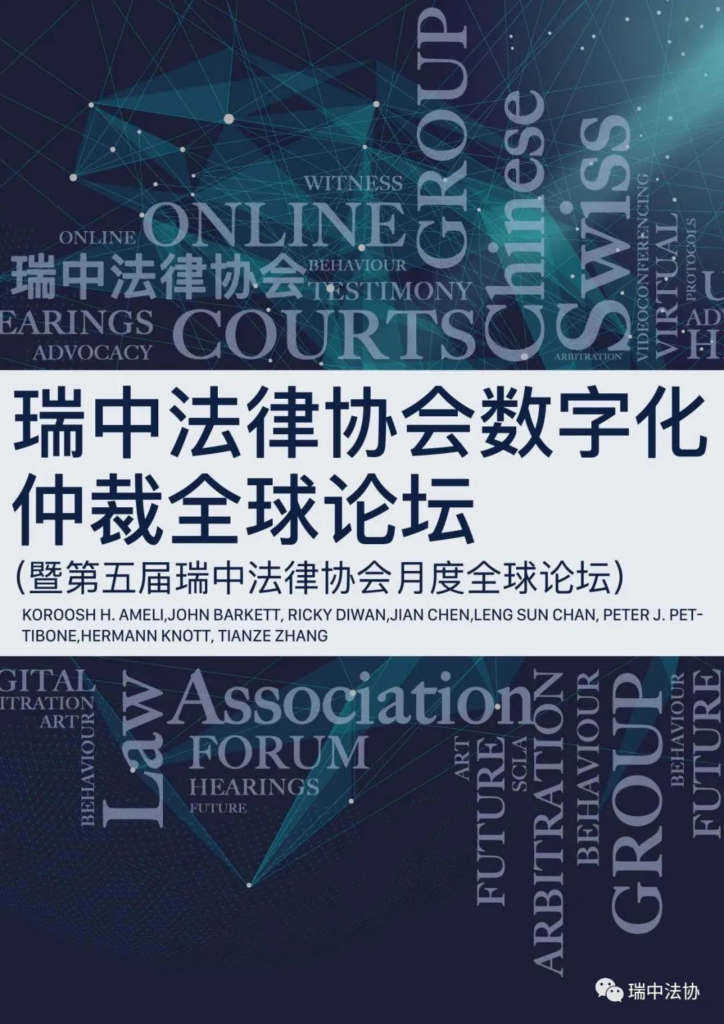
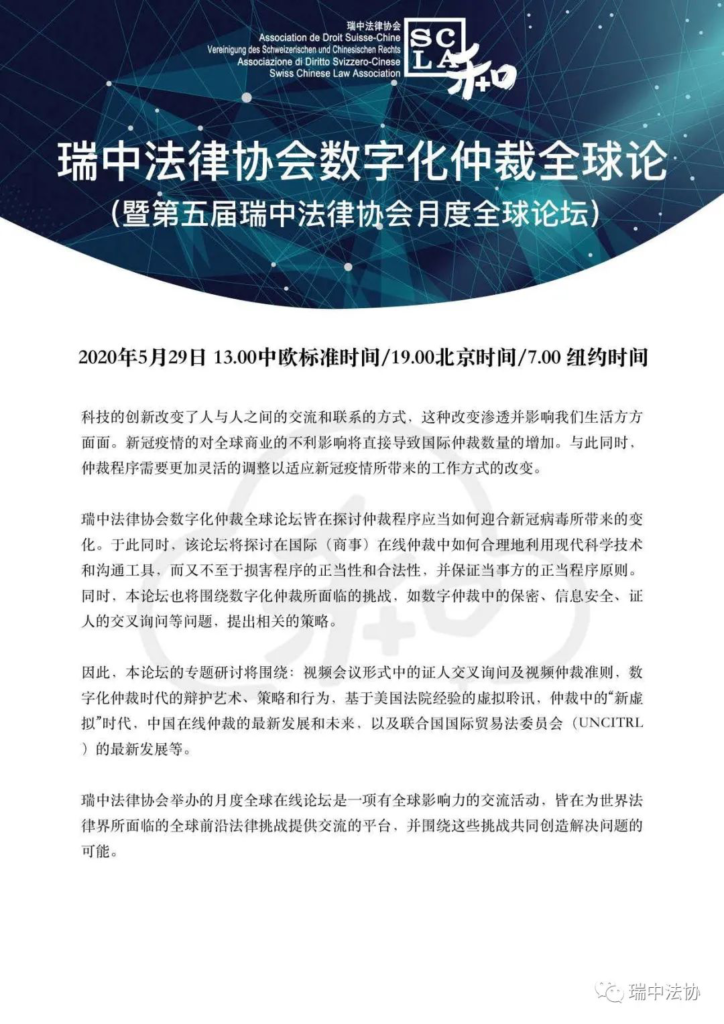
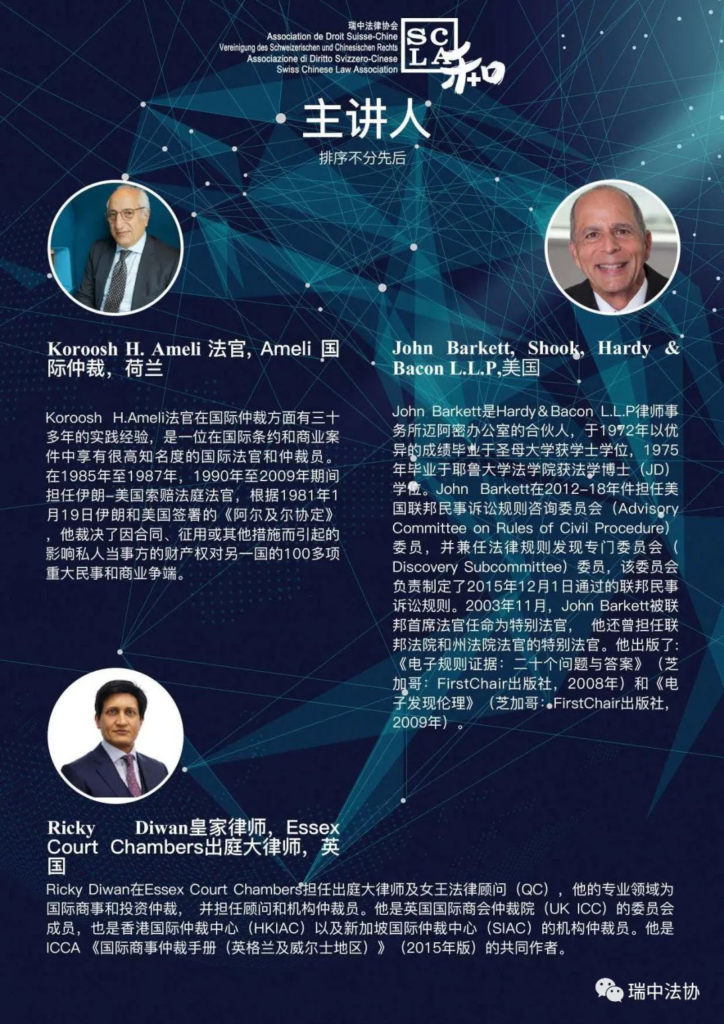
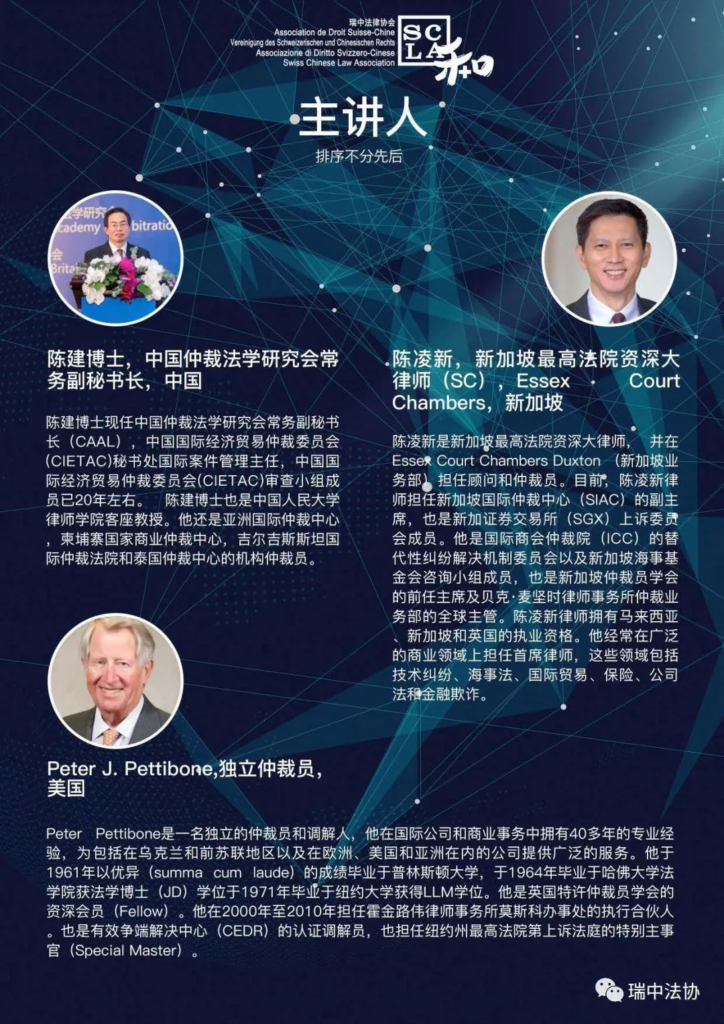
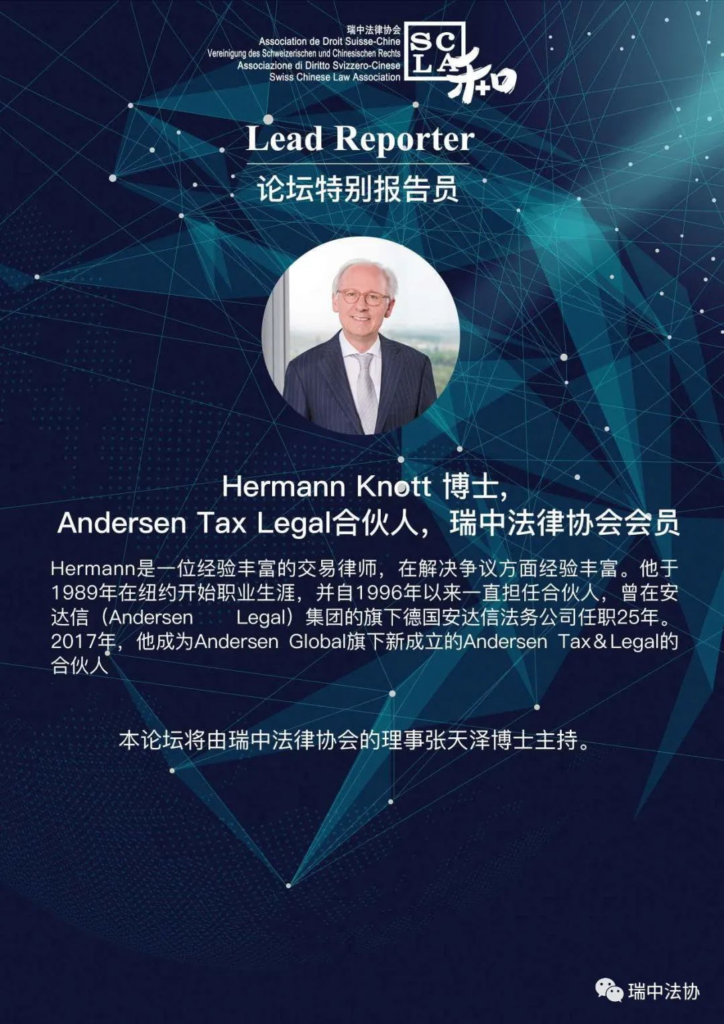
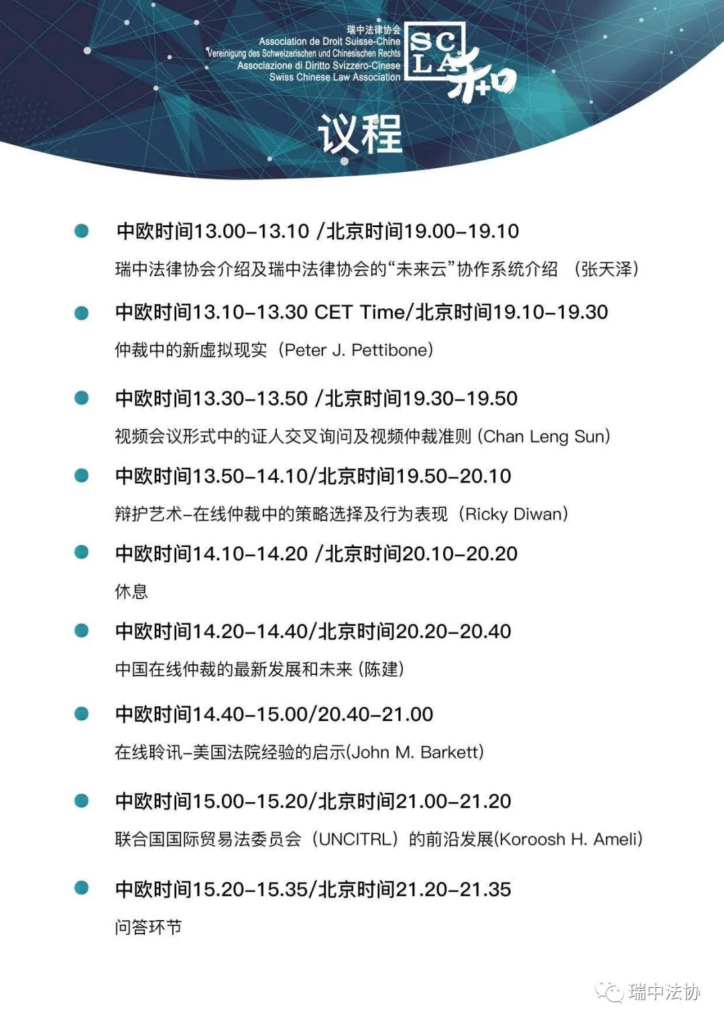
SCCL’s monthly global online forums provide a cutting-edge, cutting-edge, open platform for discussion of cutting-edge legal issues worldwide, intending to participate in and influence the world’s rule-making. The monthly online forum will be held on the Friday of the last week of each month, with May’s topic being electronic arbitration and June’s topic being force majeure. Stay tuned. Membership applications are available at www.cnsla.org/membership and are reviewed at the monthly board meetings at the end of each month.

